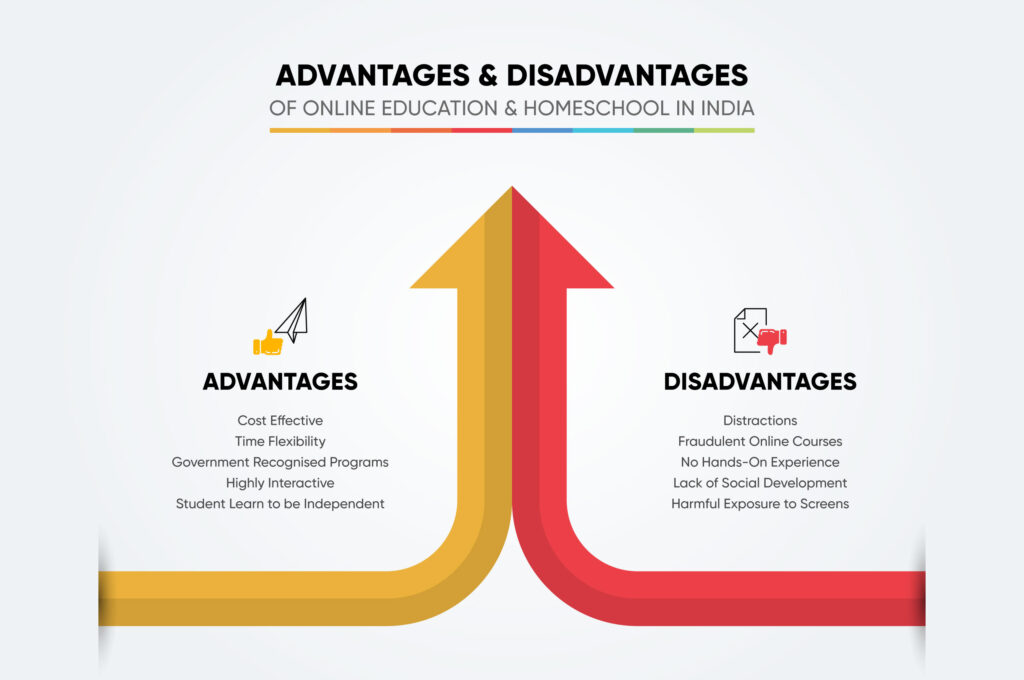




Online education has been booming in India ever since the ‘Digital India’ initiative was undertaken by Prime Minister Modi. The initiative aspires to tap into the power and versatility of digital technologies and use them to tackle deficiencies in various industries. In the Education sector this has encouraged colleges and universities to offer up courses online making education accessible to all.
But is online education working in India? Is it a worthy investment for a parent looking to homeschool his child? An optimistic forecast shows that in India, the online education market has been showing a compound annual growth rate of 52% since 2016, from $247 million it is estimated to reach $1.96 billion by the end of 2021. With a growing user-base for online courses that is estimated to reach 9.6 million by the end of 2021 it can be said with confidence that online education is making tremendous progress in India.
However, with the COVID-19 pandemic ravaging the world, online education and homeschooling have become an imperative for parents looking to homeschool their children within the safety of their homes. For these parents many questions arise and they wonder whether online education will work for their children in the long run. So let’s weigh the pros and cons of online education for homeschoolers.

ADVANTAGES
Cost Effective
Compared to an on-campus education, online education is much more affordable and provides students with the same level of information and knowledge. You can also find an enormous amount of study resources for free online. Not only that, many institutions of repute such as Harvard have made many resources and courses available for free.
Time Flexibility
You can have a flexible schedule with online education, giving homeschoolers the time to tend to other tasks or to simply take a break and recharge. Time flexibility also affords an opportunity to expand the scope of study and incorporate extra subjects that might interest the student. Moreover, the student can study at their own pace unlike traditional schooling where they have to keep up with deadlines and study under undue pressure.
Government Recognised Programs
There are many recognised programs online that also promise you an authentic degree that has credence outside the homeschooling environment. But be sure that these degrees are accredited by the Distance Education Council of India.
Highly Interactive
Traditional schooling has so far been making use of static text material through books and black/white boards while discouraging students from using laptops or cell phones in school. Online education gives students the freedom to access the internet and take advantage of a plethora of videos and interactive games that make learning fun and exciting.
Students Learn to be Independent
In a traditional classroom environment students are consistently reminded of deadlines and peer-pressure encourages them to keep up with school work. Online schooling can make the child more prone to laziness, however, on the plus side the repercussions of not meeting deadlines can cause the student to discipline themselves and be more organised. Moreover, online studies often leave the student working hard to find answers themselves instead of letting them depend on their peers or teachers.
DISADVANTAGES
Distractions
Without constant supervision students studying online are likely to let themselves be tempted by distractions. Students need to be self-disciplined, goal-oriented and self-motivated. Breaking up study hours effectively, making time for sufficient breaks, will allow the student to stay motivated and charged.
Fraudulent Online Courses
It is easy to fall into the trap of phishing websites claiming to be authentic but only aim to extract sensitive information from you. Be sure to check that the website has an “http” or “https” prefixed before its URL, nevertheless, it is always better to find the right website through a trusted source or a government portal.
No Hands-On Experience
For courses like chemistry that require hands-on experience in a lab, online courses aren’t much help.
Lack of Social Development
Not being able to interact with other people like in a classroom setting hampers the student’s social skills and might even damage their ability to confidently interact with people in the real world. However, the anonymity of the online environment also enables students to voice their problems freely..
Harmful Exposure to Screens
Studying online involves a lot of screen time and that entails eye damage in the long run. It is important to take breaks to give rest to the eyes and not forget to blink from time to time. Special glasses that protect the eyes from blue rays emitted by computer screens can mitigate the harmful effects.
Online education for homeschoolers is a good alternative to traditional schooling in many ways but also comes with glaring shortcomings that are not fit for certain fields of study that require lab work or hands-on training. Nonetheless, online learning under the supervision of parents can make up for most of the mentioned drawbacks and can still make online learning a success. Need further guidance on homeschooling or online education? Speak to our counselors.
Homeschooling can offer advantages such as cost-effectiveness, time flexibility, and government-recognised programs. However, the choice between homeschooling and public school depends on individual preferences, learning styles, and the specific needs of the student.
Homeschooling is considered better by some due to its cost-effectiveness, time flexibility, highly interactive learning materials, and the opportunity for students to learn independently. The decision depends on the priorities and preferences of the parents and students.
Homeschooling may be perceived as better by some due to its advantages like cost-effectiveness and flexible schedules. However, the effectiveness of homeschooling versus public school varies depending on individual circumstances, and both options have their own set of advantages and disadvantages.
The effectiveness of homeschooling compared to public school varies based on individual circumstances. Homeschooling can be effective due to its cost-effectiveness, flexibility, and interactive learning, but public schools also offer social interactions and hands-on experiences that homeschooling may lack. The choice depends on the priorities of the parents and students.